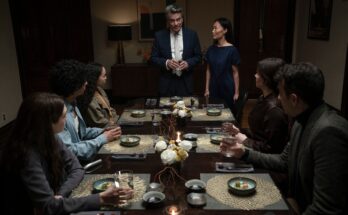Want to hear more from the actors and creators of your favorite shows and films? Subscribe to The Cinema Spot on YouTube for all of our upcoming interviews!
Representation in Film Through Music
JT: Now let’s talk about … Asian music supervisors. What are—you’re not the first though, right?
CXW: I’m actually not.
JT: Who are some others that we might be familiar with?
CXW: The music supervisor for Always Be My Maybe, the Netflix [film]. (Yes!) I think that has [an] Asian American music supervisor, and there are other Asian music supervisors, I think, but they’re all based in LA… but yeah, not a lot. I don’t think the music supervisors for Shang-Chi [and the Legend of the Ten Rings] or for Crazy Rich Asians—I don’t think their music supervisors are Asian.
There may be Asian music consultant[s] to help it, but yeah, it was a little bit surprising. Anyway, I also have other film school pals. They’re making very specific Chinese stor[ies], Chinese immigration stor[ies], and they want their specific Chinese music as well.
Some Hope
CXW (con’t): I think there [is] more space for Asian music supervisors to really bring in the context and more music, cultural background to these projects.
I think the industry is definitely doing more to help this happen. Last year, Warner Brothers Discovery—they had this music supervisor and mentorship program, specifically for underrepresented communit[ies], for media supervisors to help them grow.
Nowadays, there is definitely more. I graduated from Columbia, and I don’t think there [are] any other music supervisors from Columbia before me. … There are a lot of people also reaching out to me because they realize first of all, it’s a real job, it is a real thing that [is] needed in the industry. I got a lot of calls from film students—Asians and from other communities. They want to know how to get into this and how to have a career. For me, this is also very encouraging. Things are changing and there will be more people like us.
The Right Direction
JT: I totally get the path that you’re going through. … There [are] many doors and windows that are opened. You just have to go through those doors. I’m glad that you stepped foot into this realm of music supervision.
[As] you said, it’s not a common thing right now, but at least Hollywood—we [can] forget about awards shows and how they’re not nominating the right people—but Hollywood seems to be headed in the right direction. It’s not going to be tomorrow, but we’re going to get there.
CXW: Yeah, yeah. Absolutely, step by step. We definitely need more people in this space. “Representation matters” is applied to every industry.
How It Was
CXW (con’t): I remember, when I was in China, people [were] talking about if you wanna work in Hollywood, it’s like very difficult for Asians, especially for like non-American Asians to work in Hollywood in film or in the entertainment industry. Like, “Oh, you don’t have the cultural contacts, you are a foreigner. You are not American, you are not Western. It’s very hard for an Asian to have a job there. I grew up in China, and I don’t have a lot of access to what American[s] see and watch on a daily basis. Somehow I was just so into it. When I was in college—I definitely watched a lot of American films since I was a kid, but also—I started binging old SNL [Saturday Night Live] when I was in college. Then I started watching Seinfeld, Arrested Development, [and] all those classic American comedies.
For me, comedy and horror [are] my favorite genres. Comedy is a getaway to just understand daily life and Americans’ logic and stuff. It’s not saying—I’m totally not American still, but I definitely try my best to understand the culture here [in the United States]. Sometimes, also as an Asian, it [is] kind of overwhelming like, “Oh, this is a part of American culture. It’s incredible”.
How It Is (Or Isn’t Trying To Be)
CXW (con’t): Another thing, I remember Michelle Yeoh—when she got Golden Globes [earlier] this year, she [said] she had also all those dreams about Hollywood until she came here. She’s like, “Oh, when I got here [and] would say I’m a minority, I was like, there’s no way. I’m a minority”.
The same thing hit me when I got to this country. In China we have diversity, but it’s not like here, where we’re like—how many percent [is] Asian population [per] city and overall in America—I don’t want to get political. I didn’t know since 2016 there’s like half of America is [of Asian descent], and I never knew so many people are [Asian]. Definitely, for me, it took some time to get to know, “Okay, so this is what the real America is. And recently, because [of] all the shooting[s and] everything, it’s getting really real”. I’m Chinese, [but] I’m not a Chinese American.
The Asian Diaspora
CXW (con’t): It’s another thing to have empathy for Asian Americans. I cannot imagine the frustration for Asian Americans to bear [the sayings]: “Go back to your own country”. I got yelled at [before] … I cannot imagine for Asians [who are] actually born here. That’s another thing for me. Now, I’m a part of the Asian diaspora, [what] it’s like to understand the community as well. It’s [been] a lot of growing for me in the past four years and a half in this country. Now I am, more than ever, caring about the representation and the voices, and I just keep doing this.
JT: Yeah, the diaspora is a huge thing. I feel like the diaspora is—where I come from, you’ve got to have manners. A lot of Asian Americans where I come from, we got to have manners. The diaspora is crazy.
CXW: It’s so crazy. I remember there were some discussions about all those Chinese cuisines in America. Chicken broccoli, [et cetera]. People were talking about some Asians, non-American Asians, [but] we don’t have that in our home country. We kind of diminish the Asian immigration immigrants in this country, how they tried to make it work with the resources they have, all the ingredients they have in this country. This is still part of Asian food culture, but it get[s] diminished because that’s what they have in this country many years ago. That’s what they have to make the food. That’s just a lot of context, a lot of history.
Yeah, that’s another part of education history. I think that’s also important, nowadays, in films. We have to tell the narrative. We have to have our own narrative and have to correct what has been told by white Americans. There [are] a lot of things to do for us to educate people.
Ke Huy Quan, Crazy Rich Asians, and Stepping Stones
JT: I really agree with you right there [about] having more representation in the film industry, not just in front of the screen, but even behind the camera—[as] you were saying with Michelle Yeoh.
One thing that really spoke to me—when I saw one of the first interviews for Ke Huy Quan/ Jonathan Quan, he was talking about how Crazy Rich Asians was one of those films that represented Asians really well, the whole thing with the family. A lot of the interviews since Everything Everywhere All at Once came out. It’s really an emotional time for us Asians.
CXW: Yeah, absolutely. When I first got here was August 2018, so that’s right around [the time when] Crazy Rich Asians came out. Like the first week when I came to this country, I bought a ticket to watch it. I remember before that, Black Panther came out and it was a huge success and—
JT: For that group.
CXW: Yeah, the Black community. I want to do that; I was so encouraged and inspired by that, and I want to do the same for my community. I went and I fully enjoyed [Crazy Rich Asians]. It’s mainstream entertainment. It is family-friendly. It’s beautiful luxury life, but still, it touch[es] on the same family dynamics, the Asian family dynamics. For me, it’s so, so well done.
In Defense of Crazy Rich Asians
CXW (con’t): There are a lot of discussions in China that I saw online. People are like, “Well, they are just glossifying the Asian family, Asians’ lifestyles. We are not like that. It’s not like any ordinary family. We don’t have the luxury, we don’t have the resources, we don’t have “everything’s fancy”. Some audience[s] in China, they don’t like that. They thought it’s the wrong depiction of Asians’ life. It’s like we have all those white American films, a family of all walks of life. I think we—the Asian community would deserve complicated all kinds of lives [represented] in films. So I think Crazy Rich Asians is a perfect—
JT: Stepping stone, right?
CXW: Stepping stone. Yeah, it’s definitely not the first, but yeah—but for mainstream because it’s [a] big studio film. We are able to tell the story on that … scale of [a] far-reaching project.
Imperfect People
CXW (con’t): This year at Sundance [Film Festival], there’s a new film called Shortcomings directed by Randall Park. I worked on that as a music coordinator with Joe [Rudge] as a music supervisor. I don’t know if you have seen the reviews, it’s also about the nuanced Asian Americans. A lot of people have been talking about [how] the lead character is not likable. He’s charming, but not likable [and] has so many flaws.
I also agree. That’s also the point. You see the perfectly beautiful luxury life in Crazy Rich Asians. And there are also, at the same time, we have very just flawed, ordinary, snobbish film nerds that are Asians—that’s the main character—trying to just navigate their love life and identity in dating in the Bay Area, in New York City. I think we can have both and we can have more. For me, it’s like, we definitely need more projects like this in all kinds of ways. Because white Americans have been doing this for decades, and [we need] that too.
JT: When I compare it, there [are] two films that came out [from 20]21 to ’22. The first one was Marvel [Studios film], Shangi-Chi. Then, several months after that was Everything Everywhere All at Once. I feel the more Americanized one was Shang-Chi, and it didn’t really connect to me as much as— Again, a lot of people with the Marvel movies, it’s that genre itself is… you know, so maybe that’s why.
We did transition into a several-minute side discussion about this past month’s Academy Awards ceremony. Again, this interview was recorded in late-January of this year, so we discussed our Oscars predictions. Of course, you know which films, actors and actresses, screenwriters, and directors won in certain categories.
In the final page, we talk about Wang’s upcoming work.




5 Comments on “The Cinema Spotlight On… Cheryl X. Wang — Music Coordination, Supervision, And More (Interview)”